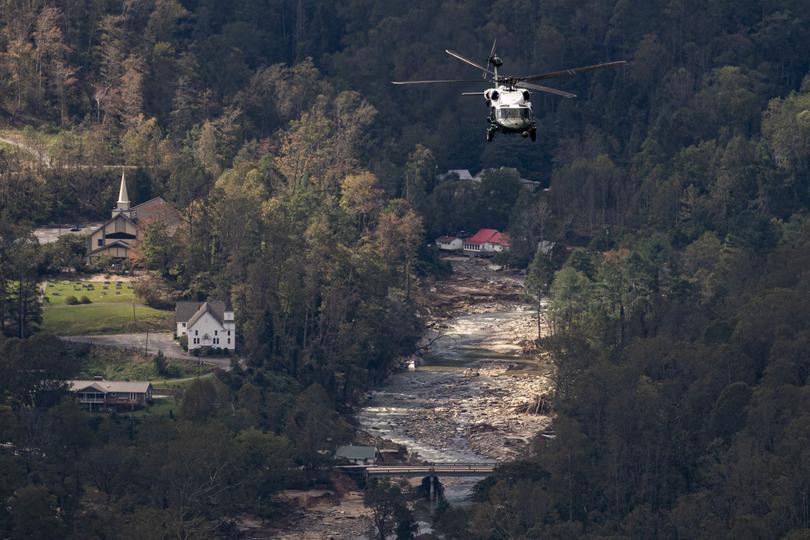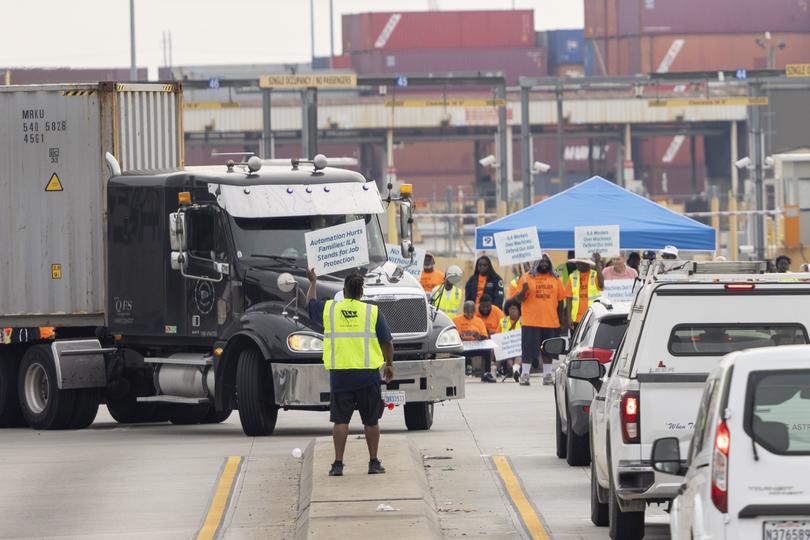US faces economic turbulence just as recession fears eased
The US economy is suddenly staring down new and potentially damaging crises, with tensions flaring in the Middle East and several states grappling with fallout from a devastating hurricane.

The US economy is suddenly staring down new and potentially damaging crises, with tensions flaring in the Middle East and several states grappling with fallout from a devastating hurricane.
The events hit just as American policymakers were gaining confidence that they had successfully tamed inflation without pushing the economy into a recession and as polls and consumer surveys suggest that Americans’ sour economic mood had begun to improve. But in just a week, new risks have emerged.
The economy now faces the prospect of an oil price spike and the aftermath of a storm that could inflict more than $100 billion in damage upon large swaths of the Southeast. Economists have also been tracking potential consequences of a port workers strike, which was suspended Thursday evening.
Sign up to The Nightly's newsletters.
Get the first look at the digital newspaper, curated daily stories and breaking headlines delivered to your inbox.
By continuing you agree to our Terms and Privacy Policy.“There’s new uncertainty,” said Joseph E. Gagnon, senior fellow at the Peterson Institute for International Economics. “If we lose oil output in the Middle East, if the ports are not functioning, then both are inflationary.”
That uncertainty is arriving just weeks before a presidential election in which the economy — in particular, inflation — is one of the biggest factors on voters’ minds and less than a month after the Federal Reserve began cutting interest rates from more than a two-decade high. The central bank has gained confidence that inflation is coming back to its 2 per cent goal but has been wary about the labour market weakening.
Even before the new risks emerged, the International Monetary Fund was projecting that the U.S. economy would slow next year.
The escalation of the conflict in the Middle East is the most worrying scenario for the world economy. Economists have warned for nearly a year that if the fighting between Israel and Hamas in the Gaza Strip became a regional war, it could cause an oil price shock that could reignite inflation around the world.
The World Bank said last October that its worst-case scenario was an outcome similar to the 1973 Arab oil embargo, which took place during the Arab-Israeli war. A disruption of that severity could remove as much as 8 million barrels of oil per day from the market and send prices as high as $157 per barrel.
This week, oil prices jumped more than 8% after Iran launched nearly 200 missiles at Israel, which vowed to retaliate. They surged Thursday after President Joe Biden, when asked if he would support an Israeli strike on Iran’s oil facilities, said: “We’re discussing that. I think that would be a little … anyway.”
Economists are watching the development closely as they consider updating their forecasts.

“So long as the conflict remains contained in the Middle East, the primary impact on the U.S. economy will likely be transmitted through energy prices,” said Michael Feroli, chief U.S. economist at J.P. Morgan.
Analysts at Capital Economics noted Wednesday that Iranian oil constituted just 4% of global supplies but that disruptions to its output could have a significant impact on prices. That could be amplified if there are disruptions at the Strait of Hormuz, through which much of the region’s oil and gas are shipped.
They suggested, however, that Saudi Arabia could ramp up production to make up for lost Iranian oil and said oil prices would most likely have to rise to $90 per barrel from the current price of about $75 for central banks to start worrying about inflation.
“Crucially, it would also be how long this is sustained for it to really move the needle for central banks,” David Oxley, chief climate and commodities economist at Capital Economics, said in a briefing. “For that to happen we’d really have to see a much bigger escalation in hostilities.”
Omair Sharif, founder of Inflation Insights, said that as a rule of thumb, a $10 rise in the cost of a barrel of oil translates to a 24-cent rise in the cost of a gallon of gasoline, which in turn would lift the monthly consumer price index measure by 0.3 percentage points.

“It could lead to second-order effects like higher airfares and higher diesel costs that boost the prices of some goods, but you’d need to see a sizable and persistent increase in oil for that to materialize,” he added in an email.
Then there is the economic concern in the United States from the effects of Hurricane Helene.
According to AccuWeather, the damage and economic loss from the storm, which dumped more than 40 trillion gallons of rain, could total between $145 billion and $160 billion. That could hurt consumer spending in states such as Alabama, South Carolina, Georgia, Florida, North Carolina, Virginia and Tennessee.
There could also be a temporary slowdown in government revenues. The IRS has given businesses and individuals in hurricane-hit areas extra time to make tax payments.
While storms tend to have little impact on overall economic output, new cracks in the nation’s supply chain — a prospect raised when 45,000 workers at East and Gulf Coast ports went on strike Tuesday — would be a different matter. On Thursday, however, the union representing the workers, the International Longshoremen’s Association, agreed to suspend its strike after receiving an improved wage offer from port employers.
Samuel Tombs and Oliver Allen, economists at Pantheon Macroeconomics, said supply chains had enough flexibility such that a strike of just a few days would have a negligible impact on the American economy. Brief strikes by workers on the West Coast in 2002 and 2015 had no discernible impact.

The Biden administration was closely monitoring the potential supply chain implications of the port strike, and officials have said they do not expect there to be an immediate impact on supplies of energy, food or medicines.
Vice President Kamala Harris said this week that she stood with the longshoremen, who she argued deserve their “fair share” of the profits made by foreign-owned shipping companies.
Former President Donald Trump blamed the Biden administration for failing to help the two sides forge an agreement and said the dispute reflected the pressure that workers have been under from inflation. He warned that an extended strike would only make things worse.
“It’s a devastating event for the economy,” Trump said in Wisconsin on Tuesday. “It’s also devastating for inflation because everything is going to cost more because of it.”
This article originally appeared in The New York Times.
© 2024 The New York Times Company
Originally published on The New York Times
